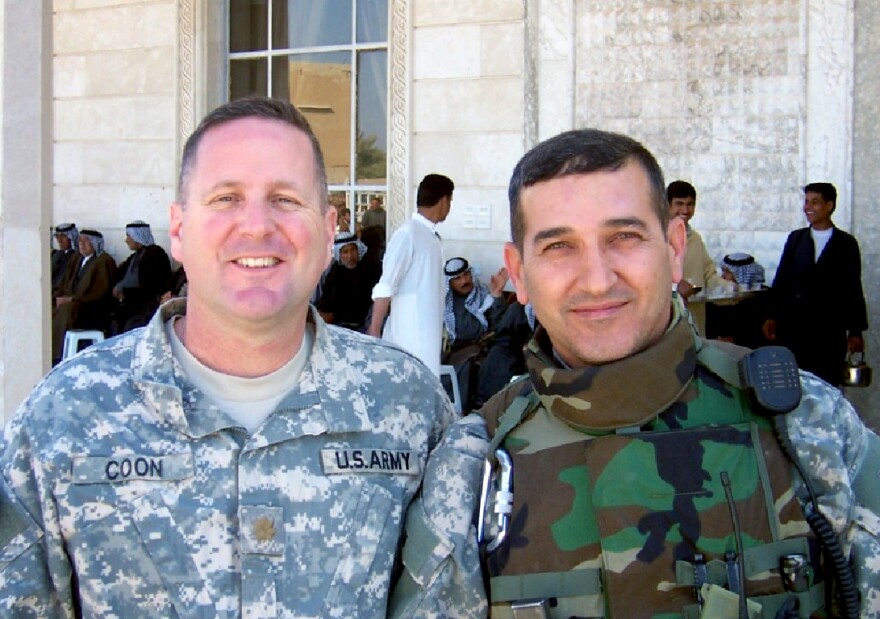http://cptv.vo.llnwd.net/o2/ypmwebcontent/2013/2013_05_21_LN%20130522%20SIV%20feature.mp3
Some veterans of the Iraq and Afghanistan wars are closely watching the immigration reform bill as it moves to the U.S Senate for a vote. The bill calls on extending a visa program for the people servicemembers often relied upon while in combat.
Timothy Coon is a full-time instructor at the State Police Academy. He also splits his time serving in the U.S Army Reserve as a Lieutenant Colonel. In 2006, he was deployed to Baquba Iraq and was away from his family for a full year. "I literally had a phone call from my daughter's fifth grade science teacher concerning the science project," he said, "while there was machine gunfire going off over our heads. The Sunnis and Shias from either side of the village were shooting at each other and we were in the middle."
Coon was assigned to a Military Transition Team whose mission was to train an Iraqi Army Unit. He had help from Iraqis like Falah Abdullatif. Abdullatif had been a Colonel in the Iraqi Air Force but after the war started, he had few options to support his family so he became a translator for the U.S Army. Coon and Abdullatif quickly became friends because they had a lot in common. They were the same age, both had lengthy careers in the military and their kids were often on their minds.
Coon: “From then on out, spent a lot of evenings sitting with him in his room talking about the day and everything in it." Lucy: So he quickly became a battle buddy? Coon:"Sure did he became a battle buddy to everybody on the team.”
Iraqi translators were vital to servicemembers in Iraq. But it was dangerous for them and their families to be found working for Americans. That’s why Congress approved a program in 2008 to allow these Iraqis to come to the U.S under a program known as a special immigrant visa. A year later, lawmakers extended the program to Afghanis also living under threatening conditions. Abdullatif says he applied for a special immigrant visa after extremists sent his family a message they couldn't ignore.
“They throw an IED on my house and blow up my car while my kids and wife were still in the house. It was a very frightening moment for my family.”
The State Department could haven given out as many as 25,000 special immigrant visas in the five years since it was created. Yet, it issued just twenty-two percent of those available. Now the program for Iraqis is set to expire in September.
Advocacy group, Iraqi Refugee Assistance Project or IRAP says thousands of men and women have been waiting, many with documents stuck somewhere in the visa pipeline. Katie Reisner is the National Public Policy director for IRAP. She says there are many servicemembers who want the visa program extended because these translators helped them when they were overseas.
“Many of these individuals who we've had contact with are really wracked with guilt after returning home to safety while not being able to bring their interpreters to safety as well.”
That’s how Coon felt when he left Iraq knowing that Abdullatif and his family were still waiting. The two men communicated through email about the status of the many documents needed.
Coon worked on his friend’s application after work and late at night. He shows me the multiple stacks of paper. “Forgive me while I look for my glasses. Ok. gosh. Here's some form called an I797c here’s another one I797, here’s a verification that he worked for the u.s military, here’s his local hire screening report..”
IRAP says it's common for the process to take up to two years for a visa to be issued. In legislation before U.S Senators, there's language calling on Congress to extend the program and includes a requirement for the State Department, Homeland Security, and Department of Defense to be more efficient in processing the applications. Reissner says this is especially important because the applicants are often in danger.
In Abdullatif’s case, it took another nine months after Coon left Iraq for he and his family to get their visas. Abdullatif tells me it was hard to leave their homeland for Connecticut but they had no other choice. "I knew it was going to be a very tough time to start from zero when I moved to the United States. But I was sure that my kids and my wife gonna live a very peaceful life and have a good education."
Life has been pretty peaceful for them in Glastonbury over the last five years. It's the same town where Coon and his family live. As Coon rustles through the papers and many emails that helped get his translator here, he gets sentimental thinking about what Abdullatif did for him and his unit. "We owe alot to Falah, not just me but everyone on the team."
There are many like Abdullatif who gave up a lot to work for the U.S military. The reality is it's tough to even get the applications started when the employer they worked for is no longer in the same country, a country turned upside down after the war. It's now up to Congress to decide if the visa program is worth extending.






